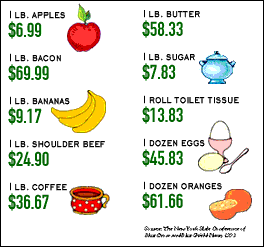Save on Your BP
 One of the most common errors made by insurance companies is miscalculation of the family deductible. For example, your plan may have a deductible of $200 per person and $400 per family. But unless the company adds up all of your family's bills, each of you might still be paying individual deductibles even though the $400 family requirement has already been met.
One of the most common errors made by insurance companies is miscalculation of the family deductible. For example, your plan may have a deductible of $200 per person and $400 per family. But unless the company adds up all of your family's bills, each of you might still be paying individual deductibles even though the $400 family requirement has already been met.
A similar error can occur if the claims office neglects to calculate your annual total out-of-pocket limit. Once you have paid this amount, generally between $1,000 and $2,000, the insurance company pays 100 percent of all other costs for the remainder of the year. So be sure to keep a careful tally of individual as well as total family payments.
Save On Your Hospital Bill
If you need surgery, ask your doctor if it can be performed on an outpatient basis or on the day you are admitted to the hospital. If not, ask if you can schedule your surgery early in the week to avoid spending the weekend in the hospital.Have all the necessary pre-op tests done before you're admitted to save at least a day or two of hospital charges.
Keep a log. Try to keep a daily record of the services, medications and other supplies you receive. You can find forms for logging tests and medication in Take This Book to the Hospital With You, from The People's Medical Society.
When you get your bill, check that you are not being charged for procedures you didn't have or items you didn't use. If you get a bill with just summary charges, ask the hospital for a detailed breakdown of your stay.
To make sure the charges are correct, start with the obvious: The room rate, number of days, major procedures, operating room, recovery room, etc. Then, compare the other charges against your records. It might take some time, but it could save you money. (For more information, see How to Check your Hospital Bills.)
Save On Your Doctors Fees
If your health insurance covers 80 percent of doctors' fees, that means your costs are 80 percent covered. Right? Not necessarily!Only 80 percent of fees the insurance company considers to be "reasonable and customary" are covered. What happens if your doctor charges $4,000 for a procedure your insurance company thinks should cost $3,500? Your insurer will only pay 80 percent of the $3,500, or $2,800. That leaves you with $1,200 to pay! Find out ahead of time how much your insurance company will pay for a procedure and tell your doctor you want to make sure his or her fee is covered by your insurance. Many physicians will agree not to charge more than that.
Money-Smart Health Care Choices
Don't repeat medical tests needlessly. If you change physicians or dentists, have your new doctor get copies of your records.Buy generic drugs, both over-the-counter and prescription, and shop around for the best price. Generics are usually a lot cheaper than name-brand medications and almost always as safe and effective. Ask your doctor to prescribe generics when they're available.
Consider buying prescription drugs from mail-order pharmacies. Mail-order firms often charge less than your local druggist. One caveat: They can't fill prescriptions as quickly. But they're perfect for patients taking medication for long-term conditions, such as high blood pressure or heart disease. Ask your personnel department if your company has a mail-order program or try a mail-order pharmacy. (For more information, see How to Save on Prescription Drugs.)
Avoid emergency rooms except in true emergencies. Show up at an emergency room at midnight with a problem that can wait until morning and you lose twice: You pay top dollar, and you wait for hours while the real emergencies are taken care of. Try your doctor or a 24-hour urgent-care center. (For more information on when to use the ER, read Before You Go to the ER, Read This.)
Get your children vaccinated, and make sure you are protected too. Although insurance may not cover their costs, immunizations are among the biggest bargains in medicine. Keep records and get boosters when needed.
Food for Thought
Here's what you'd pay today for a sampling of items if grocery prices had increased at the same rate as healthcare costs since the 1930s:
